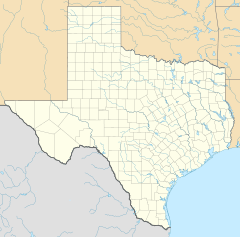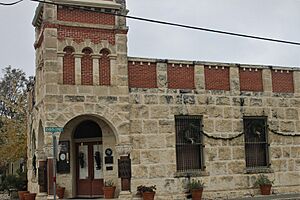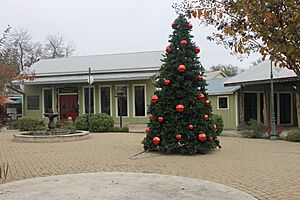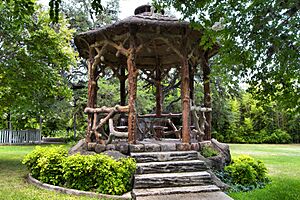Comfort, Texas facts for kids
Quick facts for kids
Comfort
|
|
|---|---|
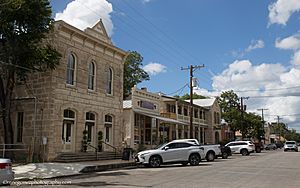
Historic downtown Comfort
|
|
| Country | United States |
| State | Texas |
| County | Kendall |
| Area | |
| • Total | 3.24 sq mi (8.38 km2) |
| • Land | 3.23 sq mi (8.36 km2) |
| • Water | 0.008 sq mi (0.02 km2) |
| Elevation | 1,427 ft (435 m) |
| Population
(2020)
|
|
| • Total | 2,211 |
| • Density | 683.3/sq mi (263.84/km2) |
| Time zone | UTC-6 (Central (CST)) |
| • Summer (DST) | UTC-5 (CDT) |
| ZIP code |
78013
|
| Area code(s) | 830 |
| FIPS code | 48-16228 |
| GNIS feature ID | 1333183 |
Comfort is a small community in Kendall County, Texas, United States. It's also called a census-designated place (CDP). In 2020, about 2,211 people lived there.
Comfort was started by German immigrants. These settlers came to the western part of the "Texas-German belt." Many people living in Comfort today are descendants of those first German families. Comfort is famous for its German history and the large ranches outside of town.
Contents
History of Comfort
Comfort was founded in 1854 by German immigrants. These settlers were known as Freethinkers, meaning they valued reason and individual freedom. They were also abolitionists, which means they were against slavery.
A 22-year-old named Ernst Hermann Altgelt helped plan the town. He measured the land for the new settlers. He stayed, got married, and raised his nine children in Comfort. Fritz and Betty Holekamp built the very first house. They started building even before Comfort was officially founded on September 3, 1854. The first churches in Comfort weren't built until 1892. A monument honoring the "Founding Freethinkers" was put up on November 2, 2002.
The downtown area of Comfort is one of the best-preserved historic business districts in Texas. There are over 100 buildings from the 1800s. Seven of these were designed by a famous architect named Alfred Giles. Mr. Giles lived in San Antonio and would travel to Comfort to check on his building projects. Most of the people living in Comfort today are descendants of the original pioneer families from the 1850s and 1860s.
Comfort is also known for a sad event during the American Civil War. The Treue der Union Monument (which means "Loyalty to the Union") honors 35 men. These men died in the Battle of the Nueces because they did not support Texas leaving the United States. The German settlers were trying to go to Mexico during the Civil War. They were attacked by Confederate soldiers near Brackettville on August 10, 1862. Their bodies were not buried at the time. Their bones were later collected and placed here in 1865. The monument was built in 1866.
In 1918, Albert Steves built a special Hygieostatic Bat Roost on his family farm. This roost was made to attract bats. The idea was that bats would eat mosquitoes and help control diseases like malaria. Dr. Charles Agustus Rosenheimer Campbell from San Antonio first developed this idea. At one time, there were 16 bat roosts built in the United States and Europe. Today, only two remain: one in Comfort and one in the Florida Keys.
Early Settlers
Some of the first settlers in Comfort came from other experimental colonies. These colonies were part of the Darmstadt Society of Forty.
Geography and Climate
Comfort is next to Kerr County on its western side. It is about 18 miles (29 km) southeast of Kerrville. It is also 16 miles (26 km) northwest of Boerne. Comfort is about 48 miles (77 km) northwest of Downtown San Antonio. The town is located where Interstate 10 and U.S. Route 87 meet.
The community is on the north side of Cypress Creek. This creek flows into the Guadalupe River.
Climate
Comfort has hot, humid summers. The winters are usually mild to cool. This type of weather is called a humid subtropical climate.
Education
Students in Comfort attend schools in the Comfort Independent School District.
Notable People
- Catherine Caradja (1893–1993), a Romanian noblewoman and helper who lived in Comfort.
- Betty Holekamp (1826–1902), an early Texas pioneer. She is sometimes called the Betsy Ross of Texas.
Images for kids
See also
 In Spanish: Comfort (Texas) para niños
In Spanish: Comfort (Texas) para niños


